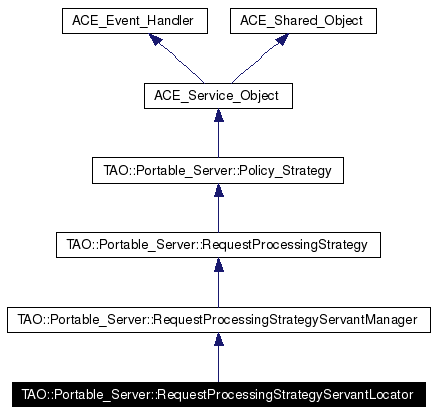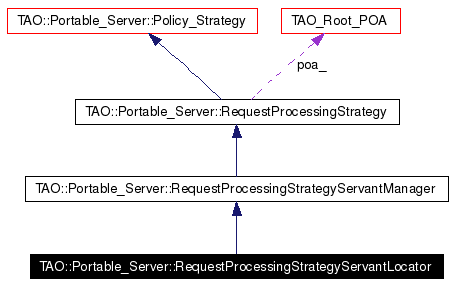
#include <RequestProcessingStrategyServantLocator.h>
Inheritance diagram for TAO::Portable_Server::RequestProcessingStrategyServantLocator:


|
|
Definition at line 24 of file RequestProcessingStrategyServantLocator.cpp.
00025 {
00026 }
|
|
||||||||||||
|
Implements TAO::Portable_Server::RequestProcessingStrategy. Definition at line 167 of file RequestProcessingStrategyServantLocator.cpp. References TAO_Root_POA::unbind_using_user_id().
00170 {
00171 if (servant)
00172 {
00173 // ATTENTION: Trick locking here, see class header for details
00174 Non_Servant_Upcall non_servant_upcall (*this->poa_);
00175 ACE_UNUSED_ARG (non_servant_upcall);
00176
00177 servant->_remove_ref ();
00178 }
00179
00180 // This operation causes the association of the Object Id specified
00181 // by the oid parameter and its servant to be removed from the
00182 // Active Object Map.
00183 if (this->poa_->unbind_using_user_id (user_id) != 0)
00184 {
00185 throw ::CORBA::OBJ_ADAPTER ();
00186 }
00187 }
|
|
|
Implements TAO::Portable_Server::RequestProcessingStrategy. Definition at line 190 of file RequestProcessingStrategyServantLocator.cpp.
00192 {
00193 }
|
|
|
Implements TAO::Portable_Server::RequestProcessingStrategy. Definition at line 42 of file RequestProcessingStrategyServantLocator.cpp.
00043 {
00044 return PortableServer::ServantManager::_duplicate (this->servant_locator_.in ());
00045 }
|
|
||||||||||||||||||||||||
|
Implements TAO::Portable_Server::RequestProcessingStrategy. Definition at line 87 of file RequestProcessingStrategyServantLocator.cpp. References TAO_Root_POA::find_servant(), TAO::Portable_Server::Servant_Upcall::locator_cookie(), TAO_Object_Adapter::lock(), TAO_Root_POA::object_adapter(), TAO::Portable_Server::POA_Current_Impl::object_id(), TAO::Portable_Server::Servant_Upcall::operation(), ACE_Lock::release(), servant_locator_, TAO::Portable_Server::Servant_Upcall::state(), and TAO::Portable_Server::RequestProcessingStrategyServantManager::validate_servant_manager().
00093 {
00094 PortableServer::Servant servant = this->poa_->find_servant (system_id,
00095 servant_upcall,
00096 poa_current_impl);
00097
00098 if (servant != 0)
00099 {
00100 return servant;
00101 }
00102
00103 // If the POA has the USE_SERVANT_MANAGER policy, a servant manager
00104 // has been associated with the POA so the POA will invoke incarnate
00105 // or preinvoke on it to find a servant that may handle the
00106 // request. (The choice of method depends on the NON_RETAIN or
00107 // RETAIN policy of the POA.) If no servant manager has been
00108 // associated with the POA, the POA raises the OBJ_ADAPTER system
00109 // exception.
00110 //
00111 // If a servant manager is located and invoked, but the servant
00112 // manager is not directly capable of incarnating the object, it
00113 // (the servant manager) may deal with the circumstance in a variety
00114 // of ways, all of which are the application's responsibility. Any
00115 // system exception raised by the servant manager will be returned
00116 // to the client in the reply. In addition to standard CORBA
00117 // exceptions, a servant manager is capable of raising a
00118 // ForwardRequest exception. This exception includes an object
00119 // reference.
00120 //
00121
00122 this->validate_servant_manager (this->servant_locator_.in ());
00123
00124 // No serialization of invocations of preinvoke or
00125 // postinvoke may be assumed; there may be multiple
00126 // concurrent invocations of preinvoke for the same
00127 // ObjectId.
00128 //
00129 // The same thread will be used to preinvoke the object,
00130 // process the request, and postinvoke the object.
00131
00132 // @@ Note that it is possible for some other thread to
00133 // reset the servant locator once the lock is released.
00134 // However, this possiblility also exists for postinvoke()
00135 // which is also called outside the lock.
00136
00137 // Release the object adapter lock.
00138 this->poa_->object_adapter().lock ().release ();
00139
00140 // We have released the object adapter lock. Record this
00141 // for later use.
00142 servant_upcall.state (TAO::Portable_Server::Servant_Upcall::OBJECT_ADAPTER_LOCK_RELEASED);
00143
00144 PortableServer::ServantLocator::Cookie cookie = 0;
00145 servant =
00146 this->servant_locator_->preinvoke (poa_current_impl.object_id (),
00147 this->poa_,
00148 operation,
00149 cookie);
00150
00151 if (servant == 0)
00152 {
00153 throw ::CORBA::OBJ_ADAPTER (CORBA::OMGVMCID | 7, CORBA::COMPLETED_NO);
00154 }
00155
00156 // Remember the cookie
00157 servant_upcall.locator_cookie (cookie);
00158
00159 // Remember operation name.
00160 servant_upcall.operation (operation);
00161
00162 // Success
00163 return servant;
00164 }
|
|
||||||||||||
|
Implements TAO::Portable_Server::RequestProcessingStrategy. Definition at line 68 of file RequestProcessingStrategyServantLocator.cpp. References CORBA::is_nil(), TAO_Root_POA::servant_present(), TAO_SERVANT_LOCATION, TAO_SERVANT_MANAGER, and TAO_SERVANT_NOT_FOUND.
00071 {
00072 TAO_SERVANT_LOCATION location =
00073 this->poa_->servant_present (system_id, servant);
00074
00075 if (location == TAO_SERVANT_NOT_FOUND)
00076 {
00077 if (!CORBA::is_nil (this->servant_locator_.in ()))
00078 {
00079 location = TAO_SERVANT_MANAGER;
00080 }
00081 }
00082
00083 return location;
00084 }
|
|
||||||||||||
|
Implements TAO::Portable_Server::RequestProcessingStrategy. Definition at line 196 of file RequestProcessingStrategyServantLocator.cpp. References CORBA::is_nil(), TAO::Portable_Server::Servant_Upcall::locator_cookie(), TAO::Portable_Server::Servant_Upcall::operation(), TAO::Portable_Server::Servant_Upcall::servant(), and servant_locator_.
00199 {
00200 // @todo This method seems to misbehave according to the corba spec, see
00201 // section 11.3.7.2. It says that when postinvoke raises an system
00202 // exception the methods normal return is overrriden, the request completes
00203 // with the exception
00204
00205 if (!CORBA::is_nil (this->servant_locator_.in ()) &&
00206 servant_upcall.servant())
00207 {
00208 try
00209 {
00210 servant_locator_->postinvoke (system_id,
00211 this->poa_,
00212 servant_upcall.operation (),
00213 servant_upcall.locator_cookie (),
00214 servant_upcall.servant ());
00215 }
00216 catch (const ::CORBA::Exception&)
00217 {
00218 // Ignore errors from servant locator ....
00219 }
00220 }
00221 }
|
|
|
Implements TAO::Portable_Server::RequestProcessingStrategy. Definition at line 48 of file RequestProcessingStrategyServantLocator.cpp. References CORBA::is_nil(), servant_locator_, PortableServer::ServantManager_ptr, and TAO::Portable_Server::RequestProcessingStrategyServantManager::validate_servant_manager().
00050 {
00051 // This operation sets the default servant manager associated with the
00052 // POA. This operation may only be invoked once after a POA has been
00053 // created. Attempting to set the servant manager after one has already
00054 // been set will result in the BAD_INV_ORDER system exception with
00055 // standard minor code 6 being raised (see 11.3.9.12 of the corba spec)
00056 if (!CORBA::is_nil (this->servant_locator_.in ()))
00057 {
00058 throw ::CORBA::BAD_INV_ORDER (CORBA::OMGVMCID | 6,
00059 CORBA::COMPLETED_NO);
00060 }
00061
00062 this->servant_locator_ = PortableServer::ServantLocator::_narrow (imgr);
00063
00064 this->validate_servant_manager (this->servant_locator_.in ());
00065 }
|
|
|
Reimplemented from TAO::Portable_Server::RequestProcessingStrategy. Definition at line 29 of file RequestProcessingStrategyServantLocator.cpp. References servant_locator_.
00030 {
00031 {
00032 Non_Servant_Upcall non_servant_upcall (*this->poa_);
00033 ACE_UNUSED_ARG (non_servant_upcall);
00034
00035 this->servant_locator_ = PortableServer::ServantLocator::_nil ();
00036 }
00037
00038 RequestProcessingStrategy::strategy_cleanup ();
00039 }
|
|
|
Definition at line 69 of file RequestProcessingStrategyServantLocator.h. Referenced by locate_servant(), post_invoke_servant_cleanup(), set_servant_manager(), and strategy_cleanup(). |
 1.3.6
1.3.6